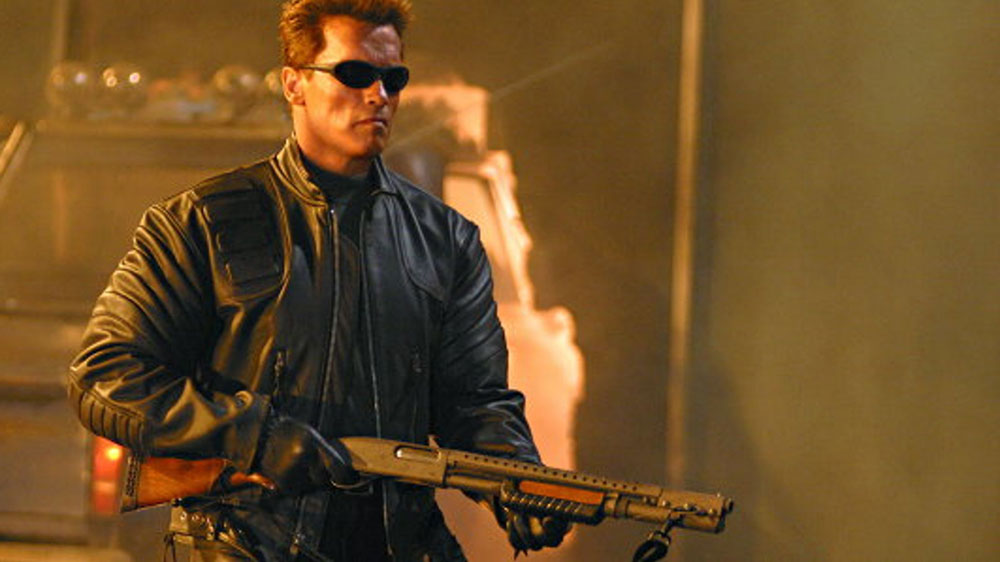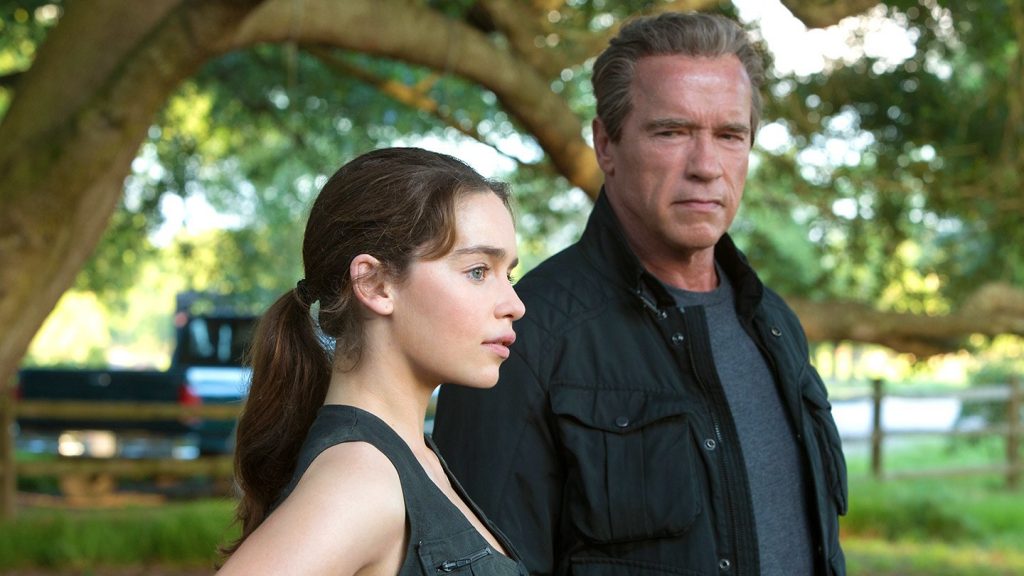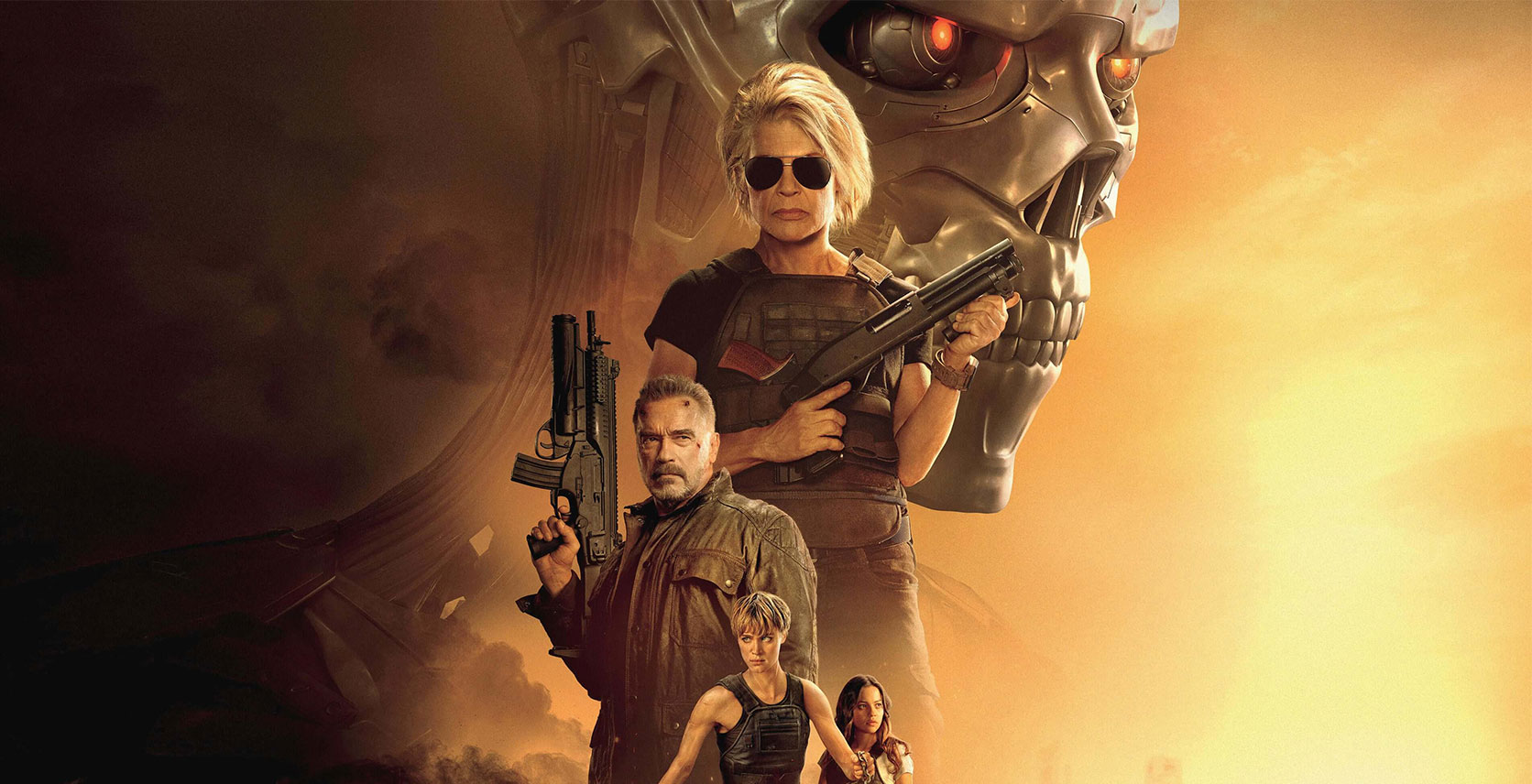Why Does History Keep Repeating Itself with the ‘Terminator’ Franchise?
It happened again. Call it fate if you want. All I know is, there was nothing I could do about it, even though I knew it was coming. It was inevitable: I let myself get excited about another Terminator sequel.
It always starts the same way… I try to remind myself how bad the last one was. How I swore I wouldn’t make the same mistake again. But then you see that first teaser trailer. Watch the Comic-Con footage. Read the fawning tweets. Maybe, just maybe, this one will be different.
There’s James Cameron giving an interview about how Terminator: Dark Fate would be a direct sequel to Terminator 2. Plus, it’s directed by the Deadpool guy. And it’s got Mackenzie Davis, you know, from Halt and Catch Fire*. (*A show that, OK, fine, I never actually got around to watching.)
And, of course, most importantly: Linda Hamilton is back. So is Cameron, not just giving the Godfather sign-off, but as a producer, with a co-credit on the story. And Arnold, obviously – even though, to be fair, he was in Rise of the Machines and Genisys too, and it really didn’t make any goddamn difference. Still, if all three are on board, how bad could it be, right?
We never stood a chance.
Together, Cameron, Hamilton, and Schwarzenegger are the Terminator franchise’s own Big Three, essentially the Holy Trinity of the series. Making their collective return the major selling point of Terminator: Dark Fate. Even though it’s getting increasingly difficult to shake the sinking feeling we already know how this is all going to play out.
If there truly is no fate but what we make for ourselves, then how come no matter what you, or I, or seemingly any combination of writers and/or directors does, history keeps repeating itself, and keeps churning out disappointingly mediocre Terminator movies?
Let’s recap the myriad reasons we’ve gotten excited about Terminator sequels in the past:
Terminator 3: Rise of the Machine

As the first post-T2 sequel, they at least came up a good idea for extending the series into a trilogy — even though it seemed like the Connors had won, Judgment Day had only been postponed, not averted. Arnold was, indeed, back. Stan Winston was still responsible for the special effects. It had Claire Danes, on the heels of a few acclaimed Oscar-nominated dramas. Also, it was 2003, OK? Sequels weren’t supposed to be any good.
Terminator Salvation

OK, yes, Rise of the Machines was kind of crummy, but just look at this cast: Christian Bale, post-Dark Knight. Sam Worthington, the Avatar star who came on Cameron’s personal recommendation. Anton Yelchin (RIP) as Kyle Reese. Bryce Dallas Howard. Helena Bonham Carter.
Plus, it was set post-Judgment Day, which at least in theory seemed like an intriguing idea — but in practice just meant cramming Terminators into an overly familiar post-apocalyptic action plot. With the series attempting to go for a Fast and Furious-style revamp, Salvation was supposed to kick off a second trilogy. Spoiler alert: it did not.
Terminator Genisys

In case you’d forgotten, yes, it was actually spelled like that. Even so, we were willing to overlook that now-painfully-obvious warning sign, thanks to the Game of Thrones connection. See, not only would Emilia Clarke, the Mother of Dragons herself, be playing Mother of the Resistance Sarah Connor in the planned reboot, it’d also be directed by Alan Taylor — an Emmy-winning GoT veteran who’d directed some of the show’s most critically-acclaimed episodes, including the first and second season finales.
The producers asked James Cameron for input. (Again.) Also, Arnold was back! (Again.) As an aged, reprogrammed T-800 (Cameron’s idea, allegedly) in an alternate 1984 that promised to ignore, and then retcon, both Rise of the Machines and Salvation. …Is any of this starting to sound familiar yet?
So, I promised this time I would be ready. I’d learn from the past; I wasn’t talking myself into another one. I wouldn’t let it happen again. And, well, it happened again, OK? I’m not proud of it.

And, to be fair, it is pretty great to see Hamilton back kicking metal ass in Dark Fate, while Schwarzenegger’s latest turn as the T-800 is the beating heart of the movie. (And, oddly, the sole comic relief.) There’s also a ballsy first act turn that makes it clear that director Tim Miller and the writers weren’t overly beholden to the franchise mythology, or intimidated by Cameron’s shadow. Gabriel Luna makes for a surprisingly-charismatic-for-a-homicidal-robot villain.
The problem is, Dark Fate — which sees yet another soldier from the future sent back to protect yet another young woman from yet another Terminator — is essentially just a slight tweaking of the original movie’s formula. That’s intentional, of course — in the same way The Force Awakens was an obvious retelling of A New Hope. Or Jurassic World vis-a-vis Jurassic Park. Or how the most recent Halloween looked to ignore decades of lesser sequels while similarly bringing its signature female badass back into the fold.
And while Dark Fate does play with the formula and/or aim for social commentary here and there, it’s only in the most clunky, obvious of ways — like the early bit showing machines literally stealing a character’s job. Oof.
It’s a script that plays like it was written by committee. (Including Cameron, there’s a total of six credited writers here.) This is a franchise that started out as a horror movie, one woman being relentlessly chased by a cold, unfeeling, unflinching machine. But while Dark Fate may borrow heavily from the plot of T1, it owes more to T2’s action blockbuster turn — which, unfortunately, in this case just translates to an interchangeable series of increasingly loud, increasingly incoherent CG-heavy action setpieces.
It’s not bad per se, just kind of… boring. A movie that was clearly content with aiming to be the third-best entry in the series, and no higher.
Re-assembling the franchise’s Big Three means you’re essentially playing with house money. And it means fans like me are going to talk ourselves into yet another go-around of cautious optimism, no matter how many times we’ve gone down this road before.
Maybe Rise of the Machines was right after all: you can’t change the future. You can only delay the inevitable. Because it sure feels like we’re stuck in a loop.










